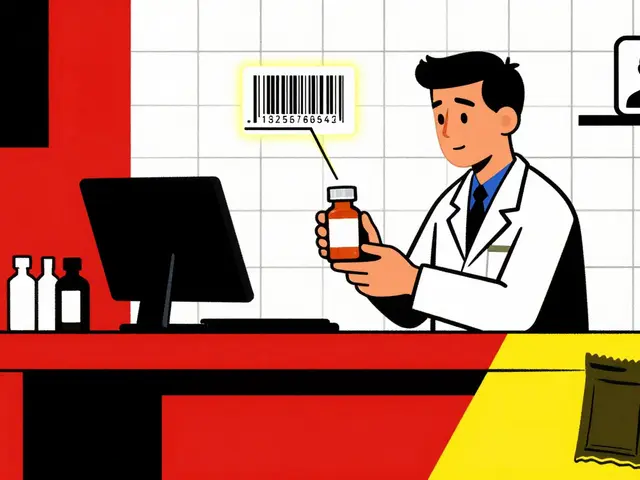Medication Weight Change Calculator
Medication Weight Change Calculator
Estimate potential weight changes from common medications based on clinical data. Results are approximate and should be discussed with your healthcare provider.
Estimated Weight Change
What this means:
Many people start a new medication expecting relief from pain, anxiety, or high blood sugar. What they don’t expect is gaining 10 pounds-or losing them-without changing a single thing about their diet or routine. Medication-related weight changes aren’t rare. They’re common, often overlooked, and sometimes avoidable. If you’ve noticed sudden shifts in your weight after starting a new drug, you’re not alone. And you’re not imagining it.
Why Do Medications Make You Gain or Lose Weight?
It’s not just about calories in, calories out. Certain drugs directly mess with your body’s natural weight controls. They do this in five main ways:- Boosting appetite: Some antidepressants and antipsychotics affect serotonin receptors, making you feel hungrier-even when you’re not. Mirtazapine, for example, can trigger intense cravings for carbs and snacks.
- Storing more fat: Diabetes drugs like pioglitazone activate receptors that turn your body into a fat-storage machine. Studies show this can increase fat cell production by 40-60%.
- Slowing your metabolism: Beta-blockers like propranolol can drop your resting metabolic rate by 8-10%. That means you burn fewer calories just sitting still.
- Trapping water: Steroids like prednisone cause your body to hold onto extra fluid. A 2-5 kg weight gain in the first month isn’t fat-it’s water, but it still feels like you’ve gained weight.
- Slowing you down: Antipsychotics like olanzapine cause drowsiness and fatigue. Mayo Clinic studies found patients on these drugs take 1,200-2,500 fewer steps a day. Less movement = fewer calories burned.
These aren’t side effects you can will away. They’re biological responses built into how the drug works. That’s why just eating less or working out harder often doesn’t fix the problem.
Which Medications Are Most Likely to Cause Weight Gain?
Not all drugs affect weight the same way. Some are notorious for packing on pounds, while others help you lose them. Here’s what the data shows:| Medication Class | Example Drugs | Typical Weight Change | Time Frame |
|---|---|---|---|
| Antipsychotics | Olanzapine, clozapine | +4.5 to +6.0 kg | First 10 weeks |
| Antidepressants | Mirtazapine, paroxetine | +2 to +5 kg | 6 months |
| Diabetes (Insulin) | Insulin, glargine | +2 to +4 kg | First year |
| Diabetes (Sulfonylureas) | Glipizide, glyburide | +3 to +4 kg | First year |
| Antidepressants | Bupropion | -1.5 to -2.5 kg | 12 months |
| Diabetes (GLP-1 analogues) | Semaglutide, liraglutide | -6 to -10 kg | 68 weeks |
| Antipsychotics | Aripiprazole | +0.2 to +0.8 kg | 12 weeks |
Notice the contrast: two drugs for depression can have opposite effects. One might help you lose weight, another could make it harder to lose even 1 pound. The same goes for diabetes meds-insulin can make you gain, while GLP-1 drugs like semaglutide help you shed 10% or more of your body weight.
What Happens When You Take Multiple Weight-Gaining Drugs?
Most people don’t take just one medication. A 55-year-old with depression, high blood pressure, and type 2 diabetes might be on five or six pills. That’s where things get dangerous.Dr. David Arterburn from Kaiser Permanente found that stacking weight-promoting drugs can lead to 10-15 kg of weight gain over five years. That’s not just a few extra pounds-it’s the difference between being overweight and obese. And it doesn’t happen overnight. It creeps up slowly, so you don’t notice until your clothes feel tight, your energy drops, or your doctor mentions your rising blood pressure.
People with a BMI over 30 are especially vulnerable. Every 5 kg gained on top of existing obesity increases heart disease risk by 12-18%, according to the Framingham Heart Study. So if you’re already at risk, a weight-gaining drug can push you into a worse health zone without you even realizing it.

Real People, Real Stories
Behind the statistics are real experiences. On Reddit, someone named ‘AnxietyWarrior87’ wrote: “I gained 18 pounds in six months on sertraline. I didn’t change my eating or exercise. I felt like my body betrayed me. I had to switch meds.”On the other side, ‘DiabetesJourney’ on HealthUnlocked shared: “Switching from insulin to semaglutide helped me lose 22 pounds while better controlling my blood sugar. I didn’t think that was possible.”
Drugs.com reviews back this up: 68% of people on olanzapine reported significant weight gain, while 82% on liraglutide saw meaningful loss. But here’s the kicker: only 38% of patients say their doctor ever mentioned weight changes before prescribing the drug. That’s not just a gap in care-it’s a missed opportunity to prevent harm.
How to Manage Weight Changes from Medications
You don’t have to just accept weight gain as part of the deal. There are clear, proven steps you can take:- Start with a baseline. Get your weight and BMI recorded before starting any new medication. This gives you a reference point.
- Know your drug’s risk. Use tools like Liverpool University’s weight gain prediction algorithm, which is 87% accurate at estimating risk based on your age, gender, and current meds.
- Ask about alternatives. If you’re on a drug known for weight gain, ask: “Is there a similar medication that doesn’t have this side effect?” For depression, bupropion is often a weight-neutral option. For psychosis, aripiprazole causes far less gain than olanzapine.
- Track your weight monthly. The Endocrine Society recommends weighing yourself once a week for the first six months. If you gain more than 2.5 kg (about 5.5 lbs), it’s time to talk to your doctor. Don’t wait until you’ve gained 15 pounds.
- Don’t stop meds cold. Stopping antidepressants or antipsychotics suddenly can cause withdrawal or relapse. Always work with your provider to switch safely.
Some clinics now offer metabolic monitoring as part of routine care. Academic hospitals have specialized teams that track weight, blood sugar, and cholesterol for patients on high-risk meds. If your doctor doesn’t offer this, ask if they can refer you to a telehealth obesity specialist-41% of U.S. clinics now partner with them.

What’s Changing in 2025?
The medical world is waking up. In January 2024, the FDA started requiring drug labels to include weight change data in milligrams per kilogram of body weight-so dosing is more precise. That’s a big step.Genetic testing is also becoming part of the conversation. Companies like Genomind now offer panels that check your HTR2C gene, which can predict if you’re likely to gain weight on certain antipsychotics. If your genes show high risk, your doctor might skip olanzapine entirely and go straight to a safer option.
The NIH just launched a $150 million initiative to develop 10 new weight-neutral versions of common drugs by 2029. That means in a few years, we might have antidepressants, antipsychotics, and diabetes meds that work just as well-but without the weight baggage.
For now, the best thing you can do is stay informed. If you’re on a medication and notice your weight shifting, speak up. Bring your numbers to your next appointment. Ask questions. Your health isn’t just about treating the condition-it’s about protecting your whole body.
Frequently Asked Questions
Can I lose weight while taking antidepressants?
Yes, but it depends on the drug. Bupropion is known to cause weight loss in many users, while SSRIs like paroxetine and mirtazapine often cause gain. If weight loss is important to you, talk to your doctor about switching to a weight-neutral or weight-loss-friendly option. You don’t have to choose between mental health and your body.
Does prednisone cause permanent weight gain?
The water weight from prednisone usually goes away once you stop taking it. But if you’re on it long-term, you may gain true fat weight because of increased appetite and reduced activity. The key is managing calories and staying active while on the drug. Work with your doctor to taper off as soon as medically safe.
Why do diabetes medications make me gain weight?
Insulin and sulfonylureas force your body to store glucose as fat instead of letting it leave through urine. When blood sugar drops too low, your body also signals hunger, leading to overeating. GLP-1 drugs like semaglutide work differently-they slow digestion, reduce appetite, and help your body use sugar more efficiently, which leads to weight loss.
Should I stop my medication if I’m gaining weight?
Never stop a prescribed medication without talking to your doctor. Stopping suddenly can be dangerous. Instead, schedule a visit to discuss alternatives. Many weight-gaining drugs have equally effective, weight-neutral options. Your provider can help you switch safely.
Are there any over-the-counter supplements that can counteract weight gain from meds?
No. There’s no supplement proven to block medication-induced weight gain. Some may even interact dangerously with your prescriptions. The best approach is medical supervision-adjusting your drug, diet, and activity levels under professional guidance. Don’t rely on pills from the store to fix what your prescription caused.
How often should I check my weight when starting a new drug?
Weigh yourself once a week for the first six months. Record it in a notebook or app. If you gain more than 2.5 kg (5.5 lbs) in a month, contact your doctor. Early intervention can prevent 3-5 kg of unwanted gain over the first year. Waiting too long makes it harder to reverse.






Sherri Naslund
November 18, 2025 AT 18:59Ashley Miller
November 20, 2025 AT 16:31Martin Rodrigue
November 20, 2025 AT 22:42william volcoff
November 22, 2025 AT 20:52Freddy Lopez
November 23, 2025 AT 12:34Lauren Hale
November 24, 2025 AT 09:35Hannah Machiorlete
November 25, 2025 AT 01:14Bette Rivas
November 25, 2025 AT 14:53prasad gali
November 26, 2025 AT 09:08Paige Basford
November 27, 2025 AT 05:11Ankita Sinha
November 28, 2025 AT 07:00Kenneth Meyer
November 29, 2025 AT 06:06Donald Sanchez
November 29, 2025 AT 09:56Abdula'aziz Muhammad Nasir
November 29, 2025 AT 19:13Tara Stelluti
December 1, 2025 AT 10:36